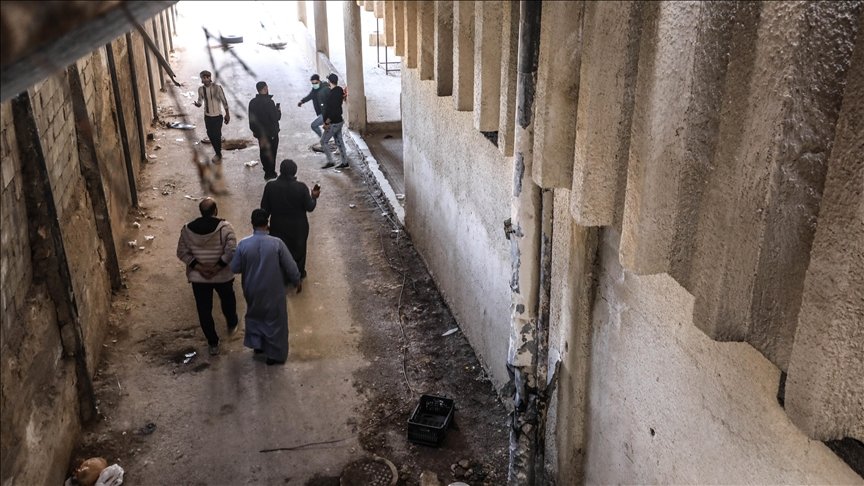
Lebanese man freed from Syrian prison speaks out
After 33 years behind bars in Syria's notorious Sednaya Prison in a rural area outside the capital Damascus, a Lebanese man recounted how he “was breathing torment every day” and had no hope of ever returning to his home country, CE Report quotes Anadolu Agency.
But today, Souhail Hamwi finally finds himself in the embrace of his homeland and family, after the rapid downfall of Syria’s Assad regime.
Hamwi, the first Lebanese national to return to his country after being freed along with other Lebanese detainees from Syrian regime prisons, told Anadolu in an interview: “I had no hope of leaving prison and returning to my homeland and my home.”
According to international reports, Sednaya Military Prison – described as a “human slaughterhouse” -- is located some 30 kilometers (18.6 miles) from the capital Damascus.
After March 2011, it became a center for detaining peaceful protesters and members of the armed opposition. Reports indicate that thousands were systematically and secretly killed inside the prison, where the regime carried out mass executions without trial between 2011 and 2015, at a rate of up to 50 people per week.
These reports also show that the regime held detainees in inhumane conditions, subjecting them to systematic torture and depriving them of food, water, and medical care.
Early Sunday morning, anti-regime factions entered Damascus and took control after regime forces withdrew from public institutions and streets, thus ending 61 years of the bloody Baath Party regime and 53 years of Assad family rule.
Clashes between Syrian regime forces and opposition factions began on Nov. 27 in the provinces of Aleppo and Idlib – both of which fell under the factions’ control – and then spread to the cities of Hama, Daraa, Sweida, Homs, and finally Damascus.
Torment and despair
Hamwi was arrested in 1991 by Syrian military intelligence on charges of belonging to the Lebanese Forces party, known for its opposition to the Syrian presence in Lebanon. He is one among hundreds of Lebanese nationals who went missing in Syrian prisons, according to Lebanese human rights groups.
“I was sentenced to life in Sednaya Prison, and here I am today back in the same house from which I was arrested in the town of Chekka (northern Lebanon) by Syrian intelligence 33 years ago,” he said.
The freed prisoner described the suffering he endured during over three decades of detention. He moved between Anjar Prison in eastern Lebanon – then under Syrian administration – to Adra Prison in Damascus, Latakia Prison, and finally to the notorious Sednaya Prison.
He added: “During some periods of detention, I was in solitary confinement for 15 years before being transferred to Sednaya Prison, where I was placed in a communal cell.”
Swift release
On the conditions of his detention, Hamwi said: “Everything I lived and breathed from the moment of arrest was torment … a feeling mixed with despair and deprivation. I had no hope at all that I would ever leave the prison again.”
He added: “There were no visits, and communication with family and relatives was completely forbidden. I believe there was a shortfall in media coverage of our tragedy.”
On his dramatic release over the weekend, he said: “We knew there were events happening outside, but we never expected to get out of prison so quickly.”
He added: “I heard gunfire but don’t know who freed me. I walked about 15 kilometers (9.3 miles) on foot before someone gave me a ride to Lebanon.”
A glimmer of hope
Lebanon’s National News Agency reported earlier on Monday that Hamwi is among the first prisoners to return to Lebanon, a step that raised hopes of the return of remaining Lebanese detainees and those who have gone missing.
During Syria’s nearly 30-year presence in Lebanon (1976–2005), a number of Lebanese were arrested and transferred to Syrian prisons for various reasons, including belonging to parties opposed to this presence, or on suspicion of collaboration with groups considered “hostile” to the Syrian regime at the time.
Additionally, some Lebanese were subjected to enforced disappearance, with no real explanation for their detention, especially during the Lebanese Civil War (1975–1990).
In the past, the Assad regime released Lebanese detainees in two batches: the first batch in 1998, which included 121 Lebanese nationals, and the second in 2000, which included 54. However, Lebanese organizations maintain that hundreds of Lebanese remain in Syrian prisons, a claim the defunct Assad regime denied.
According to the Association of Lebanese Political Prisoners in Syrian Prisons, a non-governmental group, some 622 Lebanese nationals remain forcibly disappeared in Syrian prisons.
*Writing by Rania Abu Shamala























